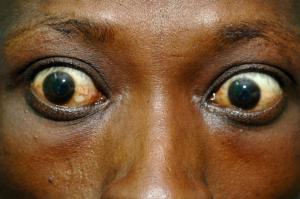Exophthalmos (bulging eyes)
Exophthalmos, also known as proptosis, is a medical term for a bulging or protruding eyeball or eyeballs. It's most often caused by thyroid eye disease. See your GP or an optometrist (optician) if you notice that one or both of your eyes are protruding.
About exophthalmos (bulging eyes)
If you have exophthalmos, there's also a small risk of the optic nerve (which transmits signals from the eye to the brain) becoming compressed.
This may affect your sight permanently if it isn't treated quickly.

Many of the symptoms of thyroid eye disease tend to improve over time, although this can take a number of years.
There's a chance your eyes will continue to protrude if corrective surgery isn't carried out.
Some people with exophthalmos are left with long-term vision problems, such as double vision.
Permanent visual impairment is rare if the condition is identified and treated quickly.
When to get medical advice
See your GP or an optometrist (optician) if you notice that one or both of your eyes are protruding.
It's important to identify the underlying cause, so treatment can be given.
Treatment is often more effective if it's started as soon as possible.
If necessary, your GP or optometrist can refer you to an ophthalmologist (a specialist in diagnosing and treating eye conditions) for further assessment.
Diagnosing exophthalmos
If you're referred to an ophthalmologist, they'll check how well you're able to move your eyes. They may also use an instrument to measure how far your eyeball protrudes.
If the ophthalmologist wants to examine your eye socket in more detail, a computerised tomography (CT) scan or magnetic resonance imaging (MRI) scan may be carried out.
You may also have a blood test to assess how well your thyroid gland is working. You may be referred to an endocrinologist (a specialist in conditions affecting glands and hormones) if you're found to have abnormal thyroid hormone levels.
Causes of exophthalmos
One of the main causes of exophthalmos in the UK is thyroid eye disease, also known as Graves' ophthalmopathy.
This is an autoimmune condition that affects around one in every three people with an overactive thyroid gland (hyperthyroidism) caused by Graves' disease. It's also common in women aged 30 to 50 and people who smoke.
An autoimmune condition is where the immune system (the body's defence against illness and infection) mistakenly attacks healthy tissue.
In the case of thyroid eye disease, the immune system attacks the muscles and fatty tissues around and behind the eye, causing them to become inflamed (swollen).
Thyroid eye disease can also occasionally affect people with an underactive thyroid gland (hypothyroidism) and in rare cases, people with seemingly normal thyroid function.
Other causes
Exophthalmos can also have a number of other causes, but these are generally less common than thyroid eye disease.
Other causes of exophthalmos can include:
- an injury to the eyes
- bleeding behind the eyes
- abnormally shaped blood vessels behind the eyes
- an infection of the tissue in the eye socket
- cancerous tumours, such as those caused by neuroblastoma and some soft tissue sarcomas
Exophthalmos can also affect newborn babies if they're born with eye sockets that are shallower than normal.
Treating exophthalmos
If exophthalmos is being caused by thyroid eye disease, the following treatments are often helpful:
- medication to correct the level of thyroid hormones in your blood – this may not improve the problems with your eyes, but may stop them getting worse
- corticosteroid medication given directly into a vein (intravenously) to help reduce inflammation
- corrective surgery to improve the appearance of your eyes once the inflammation is under control
Other useful measures include:
- stopping smoking
- using artificial tears to reduce eye dryness and irritation
- wearing special lenses to correct double vision
In other cases, treatment will vary depending on the underlying cause. For example, treatments such as radiotherapy, chemotherapy and/ or surgery may be recommended if exophthalmos is caused by a tumour.
Complications of exophthalmos
Depending on what's causing your bulging eyes, you may also have other associated symptoms. For example, if exophthalmos is caused by a thyroid eye disease, your eyes may also be:
- inflamed, red and painful
- dry and gritty
- tearful
- sensitive to light (photophobia)
You may also experience some double vision.
In severe cases of exophthalmos, you may not be able to close your eyes properly. This can damage your corneas (the transparent tissue that covers the front of your eye) by causing them to dry out.
If your corneas become very dry, an infection or ulcers (open sores) may develop. These could damage your vision if left untreated.
More useful links
The information on this page has been adapted from original content from the NHS website.
For further information see terms and conditions.